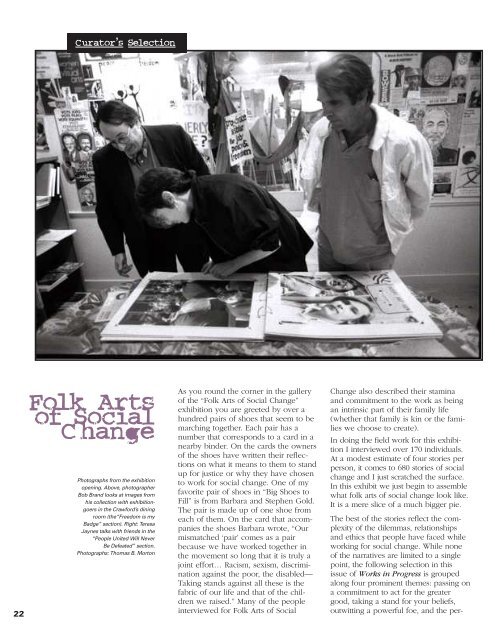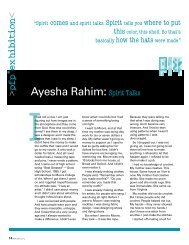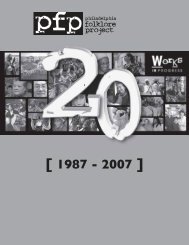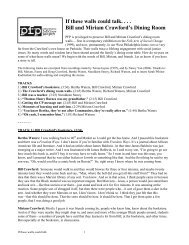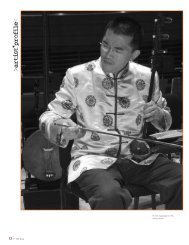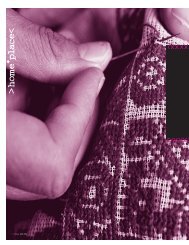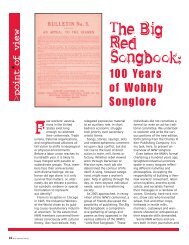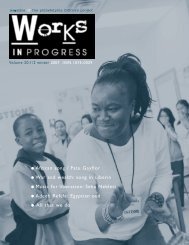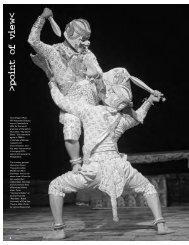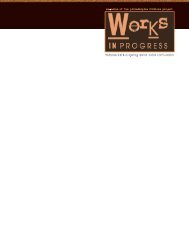View PDF - Philadelphia Folklore Project
View PDF - Philadelphia Folklore Project
View PDF - Philadelphia Folklore Project
Create successful ePaper yourself
Turn your PDF publications into a flip-book with our unique Google optimized e-Paper software.
Curator’s Selection22Folk Artsof SocialChangePhotographs from the exhibitionopening. Above, photographerBob Brand looks at images fromhis collection with exhibitiongoersin the Crawford’s diningroom (the“Freedom is myBadge” section). Right: TeresaJaynes talks with friends in the“People United Will NeverBe Defeated” section.Photographs: Thomas B. MortonAs you round the corner in the galleryof the “Folk Arts of Social Change”exhibition you are greeted by over ahundred pairs of shoes that seem to bemarching together. Each pair has anumber that corresponds to a card in anearby binder. On the cards the ownersof the shoes have written their reflectionson what it means to them to standup for justice or why they have chosento work for social change. One of myfavorite pair of shoes in “Big Shoes toFill” is from Barbara and Stephen Gold.The pair is made up of one shoe fromeach of them. On the card that accompaniesthe shoes Barbara wrote, “Ourmismatched ‘pair’ comes as a pairbecause we have worked together inthe movement so long that it is truly ajoint effort… Racism, sexism, discriminationagainst the poor, the disabled—Taking stands against all these is thefabric of our life and that of the childrenwe raised.” Many of the peopleinterviewed for Folk Arts of SocialChange also described their staminaand commitment to the work as beingan intrinsic part of their family life(whether that family is kin or the familieswe choose to create).In doing the field work for this exhibitionI interviewed over 170 individuals.At a modest estimate of four stories perperson, it comes to 680 stories of socialchange and I just scratched the surface.In this exhibit we just begin to assemblewhat folk arts of social change look like.It is a mere slice of a much bigger pie.The best of the stories reflect the complexityof the dilemmas, relationshipsand ethics that people have faced whileworking for social change. While noneof the narratives are limited to a singlepoint, the following selection in thisissue of Works in Progress is groupedalong four prominent themes: passing ona commitment to act for the greatergood, taking a stand for your beliefs,outwitting a powerful foe, and the per-sonal liberation that can come withfighting for equity and justice.But while these stories contain theusual suspects of corrupt politiciansand abusive police, they gobeyond simple morality tales ofthe struggle between good andevil. Along with bold acts of heroism,there are stories of reluctantheroes. There are tales of prejudiceand violence within theranks, and stories of burnout fromthe tedium of organizing and ofpaying the price for one’s beliefs.Whether the setting is in the 1950sor in the late 90s, there is a consistentthread of finding one’s familyof choice and of buildingcommunity through that work.Ultimately, each story reflects abasic credo: stay informed, participateand make a difference. All ofthe stories come from interviewsand are transcribed as they werespoken. Cuts are marked withellipses and our edits with brackets.As usual, we edit only minimally,preserving the style ofspoken words, of peoples’ voices.I am honored to have had theopportunity to get a glimpse ofthe diverse legacy of socialchange in <strong>Philadelphia</strong>. The menand women who participated inthis project lent more to us thanjust their memorabilia, art, orshoes. I was deeply moved andinspired by the collective wisdomand compassion that I found. The<strong>Philadelphia</strong> <strong>Folklore</strong> <strong>Project</strong> isindebted to the many people whotook time away from their work toshare their experiences andinsights with us.—Teresa JaynesPassing it on“My father…raised us to be concernedabout bigger things. Imean still be concerned aboutyour immediate family, butwe…were kind of raised socially.So our house was this open door.Anybody that needed a place tostay could stay there. I mean,every Sunday he fixed breakfast,fish and grits and coffee, and peoplewould just pile in the house.And you would hear all the conversation.This is where I first started hearingpolitical conversation, and not justabout the Vietnam War, but aboutthe Second World War and theKorean War, which I had a brotherin. Second World War whichmy father and his peers were in.You got a chance to hear thisracist stuff about the war and thekind of things that they did… Soyou would hear all the politicalstuff about work and all that.You’d hear the social gossip aboutwhose cheatin’ with who and whowas in the bar the night before.You know? And who’s locked up.[Continued on p. 24 ➝]23


